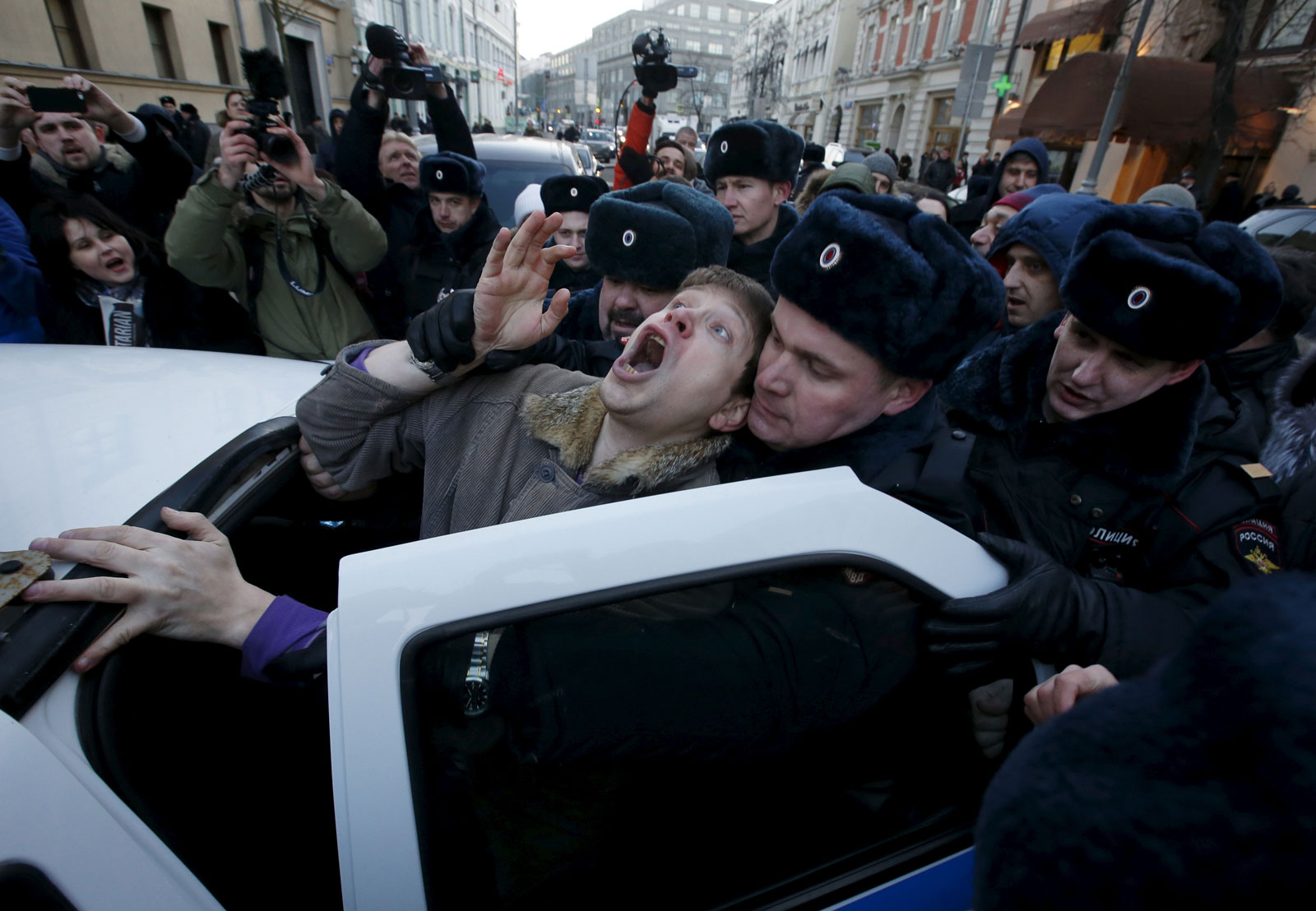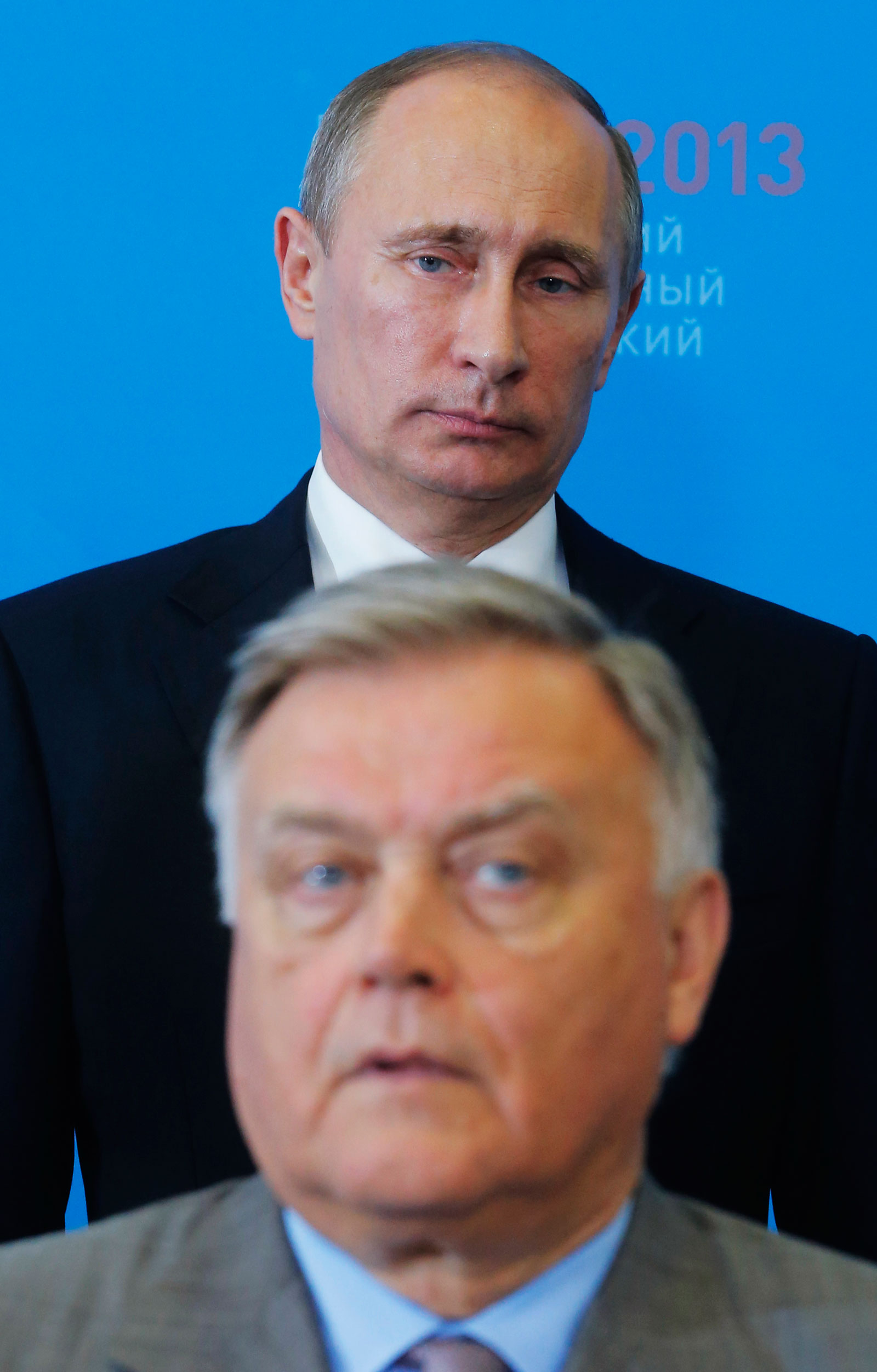On Monday evening, Russian President Vladimir Putin went on national television to announce that, following a telephone conversation with President Barack Obama, Russia and the US had reached an agreement on a “cessation of hostilities” in Syria, to begin at midnight on February 27. Putin went out of his way to present Russia as a team player, in step with the West on Syria, though the accord allows bombing to continue against the Islamic State (ISIS), the al-Qaeda-backed Nusra Front, and “other terrorist groups”—a loose category that for Russia might include anti-Assad forces that the US and Western allies have been backing. Indeed, the agreement was the latest indication of how far the Russian government has been able to pursue its interests in the conflict—while gaining new diplomatic stature. As Nicholas Burns, former US undersecretary of state for political affairs, told The Washington Post after a similar peace effort in mid-February, “We are being completely outfoxed in Syria by Putin.”
But Putin’s newly-claimed role as a world leader may also be aimed at distracting Russians from more pressing concerns at home. With plunging oil prices and double-digit inflation, the Russian economy is cascading downward, causing some of the largest protests the Kremlin has faced in several years. The price of oil, a mainstay of the Russian economy, fell from $110 per barrel in June 2014 to $27 in January this year. The ruble has lost 60 percent of its value against the dollar since 2013, and real wages of Russians have shrunk by almost 10 percent in the past year. A recent poll by the respected Levada Center in Moscow found that more than half of all Russians—53 percent—think the greatest threat now facing their country is economic impoverishment.
Meanwhile, the Kremlin has been confronted with some of the most devastating revelations of high-level government corruption yet to surface during the Putin era. They have even touched two of Putin’s closest allies, Vladimir Yakunin, the former president of Russian Railways, and Yuri Chaika, Russia’s powerful prosecutor general. This combination of economic turmoil and faltering government credibility could threaten the stability of the Putin regime, especially if ordinary Russians lose enthusiasm for its military ventures abroad.
Faced with a growing budget deficit—$38.6 billion this fiscal year—the Kremlin has been racing to cut costs and raise revenue. But it has met with stiff resistance. Long-distance truckers, an essential part of the Russian economy, began protests against a new road tax in November. In early December they tied up traffic in Moscow, but were pushed back by police and have camped out ever since in improvised shelters outside the city. Now a major, ten-day strike of truckers from forty of the country’s regions is about to begin, and it is sure to cause major chaos. Significantly, the truckers have broadened their protests to include a range of economic issues. As one trucker put it: “For the outside, [Putin] is great for many … he’s sticking his nose into everything — Syria, Turkey — so good, so powerful, but in his own country, he can’t even talk to the people.”
Since the start of the year, such unrest has spread to other constituencies as well. In several cities, pensioners and mortgage holders have been staging economic protests. In Krasnodar and Sochi, hundreds of pensioners came out to protest the government’s decision to revoke their transportation subsidies. In Volgodonsk, several hundred pensioners took part in a recent rally against a new law monetizing their benefits because the cash payments they receive are not sufficient to cover the costs of what they previously got for free. And in Moscow on February 8, riot police confronted over a hundred holders of foreign-currency mortgages, who had blocked a street next to the Russian Central Bank. The protesters, who cannot make their mortgage payments because of the decline in the value of the ruble, are demanding a recalculation of their loans. Similar mortgage holders have been demonstrating outside several banks in Moscow on a daily basis.
What may make these isolated protests more dangerous is that they are occurring just as the issue of government corruption is spilling into the mainstream media. In early February anti-corruption blogger Alexei Navalny reported that Yakunin, the former railway boss, is under investigation by the Russian police, the MVD. Yakunin’s history with Putin dates back to the 1990s in St. Petersburg, where both were pursuing financial gain from the newly created free-enterprise economy. Yakunin was a neighbor of Putin at the elite Ozero dacha cooperative, which they founded in 1996. In 2005 Putin appointed Yakunin head of Russian Railways, a powerful and lucrative monopoly that became Yakunin’s sinecure. According to Forbes magazine, Yakunin’s income in 2013 was $15 million.
Advertisement
But Yakunin’s cozy relationship with Putin started to falter in 2013, after Navalny, who along with a dogged research team culls information from public records, described a large chain of hotel complexes and off-shore companies that Yakunin and his two sons had acquired:
We state that the family of … Yakunin, with the aid of corruption and abuse, has constructed a business empire, incorporating offshore companies around the world. The value of this empire is in the billions of dollars.… It is a mafia family of the purest kind, and it exists due to its mafia boss, Vladimir Putin, who gives license to steal everything around.
Apparently under pressure because of these revelations, as well as Yakunin’s gross mismanagement of the railway system, Putin finally fired him in August 2015. But Yakunin did not disappear. In a recent interview with Bloomberg in January, Yakunin, who in 2014 had been put on the US sanctions list (travel bans and asset freezes for specified Russian officials) because of the Ukrainian conflict, talked openly about the vulnerability of the Russian ruling class and observed that the “circle will continue to rotate.” The message was that no one in the financially privileged Russian elite is secure.
These charges have coincided with new corruption revelations about Yuri Chaika, the Russian prosecutor general, who has been one of Putin’s closest allies since his appointment in 2006. Chaika has opened numerous cases against Putin’s critics and has led, with other arms of the Russian criminal justice system, investigations into murders of political opponents of Putin that have exonerated the Kremlin. On December 1, Navalny’s Fund to Combat Corruption released an explosive forty-minute video documenting large business enterprises belonging to Chaika’s family that are tied to a notorious criminal gang in the south of Russia. The video also showed footage of a luxurious hotel in Greece and a villa in Switzerland that Chaika’s son Artyom had purchased allegedly by illegal privatization of state property in Russia.
Then came a remarkably blunt music video by Pussy Riot—a group known for its tangles with the Kremlin—that was aimed directly at Chaika. Posted on YouTube on February 3, the video mocks Chaika for his family’s corruption and his protection of other corrupt Russian officials in the Kremlin, even as he imposes arbitrary and abusive justice on people the government doesn’t like.
Of course, corruption among close relatives of high Russian officials is hardly new. (Indeed Yeltsin famously put his money in Swiss bank accounts for his daughters.) But in the past, such allegations were mostly only reported in the marginalized, independent Russian media, and would have been ignored by the Kremlin. Navalny’s video was watched on YouTube by over four million viewers in December alone. Chaika was forced to respond, saying that the film’s allegations were a “hatchet job” financed by William Browder, a former investor in Russia and now a leading critic of the Kremlin. Putin, when asked about the scandal at his annual news conference in December, could only say, feebly, that he did not know whether or not Chaika’s sons had done something illegal.
Even Putin’s daughters, hitherto a taboo topic in the media, are not immune to reports that they have benefited financially from family connections. Putin’s younger daughter Katerina recently married the son of a Putin crony, Kirill Shamalov, and the two have a reported net worth of close to $2 billion. The younger Shamalov reportedly gained his wealth by acquiring a major stake in a Russian oil and gas company after borrowing money from a bank owned by a close Putin associate, Gennady Timchenko.
The ever courageous and persistent Navalny has documented these allegations in a February 11 blog post and has filed a suit against Putin with a Moscow regional court for violating the Russian Constitution concerning conflicts of interest on the part of government officials.
In a recent interview, Lev Gudkov, the head of the Levada Center, was asked about the effect these reports were having on the public mood. “Corruption scandals are erupting weekly, with high-level officials appearing on the screen…Whether one likes the regime or not, the general impression is one of total corruption.”
For the moment, the growing discontent may be alleviated somewhat by Russia’s aggressive policies abroad. For example, thanks to the propaganda efforts of state-controlled television, the Kremlin’s military interventions in Crimea and Eastern Ukraine have bolstered Putin’s image as a strong leader. Russians are traditionally patriotic and nationalistic, and polls showed that they endorsed the decision to invade Crimea in early 2014 and bought the Kremlin’s line that Russia had to support separatists in Eastern Ukraine because the West had engineered a change of government in Kiev that threatened Russia. The majority of Russians also agreed with the Kremlin’s September 2015 decision to start a bombing campaign against ISIS and other anti-Assad rebels in Syria. A Levada Center poll taken at the end of January found that a majority still approves of the Kremlin’s campaign to support the Assad regime, but also that Russians are losing interest in the Syrian conflict, presumably because they are focusing on economic concerns.
Advertisement
One sign of how seriously the government is taking the current economic crisis is its plan to raise billions of dollars through a new round of privatizations, including share offerings for a major shipping firm, Sovkomflot, and two state-owned oil companies, Rosneft and Bashneft. But these offerings may end up with the spoils going to Russia’s oligarchs and further accusations of corruption. As two Russian journalists observed: “Russian’s [sic] well-connected magnates may have to be cajoled into investing at a critical juncture for the economy, but could in the long term end up with valuable assets at bargain prices, leaving the Kremlin open to accusations of sweetheart deals.”
How will all this affect Putin? Another recent Levada poll showed that 82 percent of Russians would vote for him if elections were held now. Pollster Gudkov explained: “Where do the ratings of Putin come from and what supports them? They rest on the illusion that somehow Putin can get us out of the crisis and continue on the course that brought economic well-being since 2000.” But presidential elections are not scheduled until March 2018. Will Putin be able to sustain the illusion until then?




